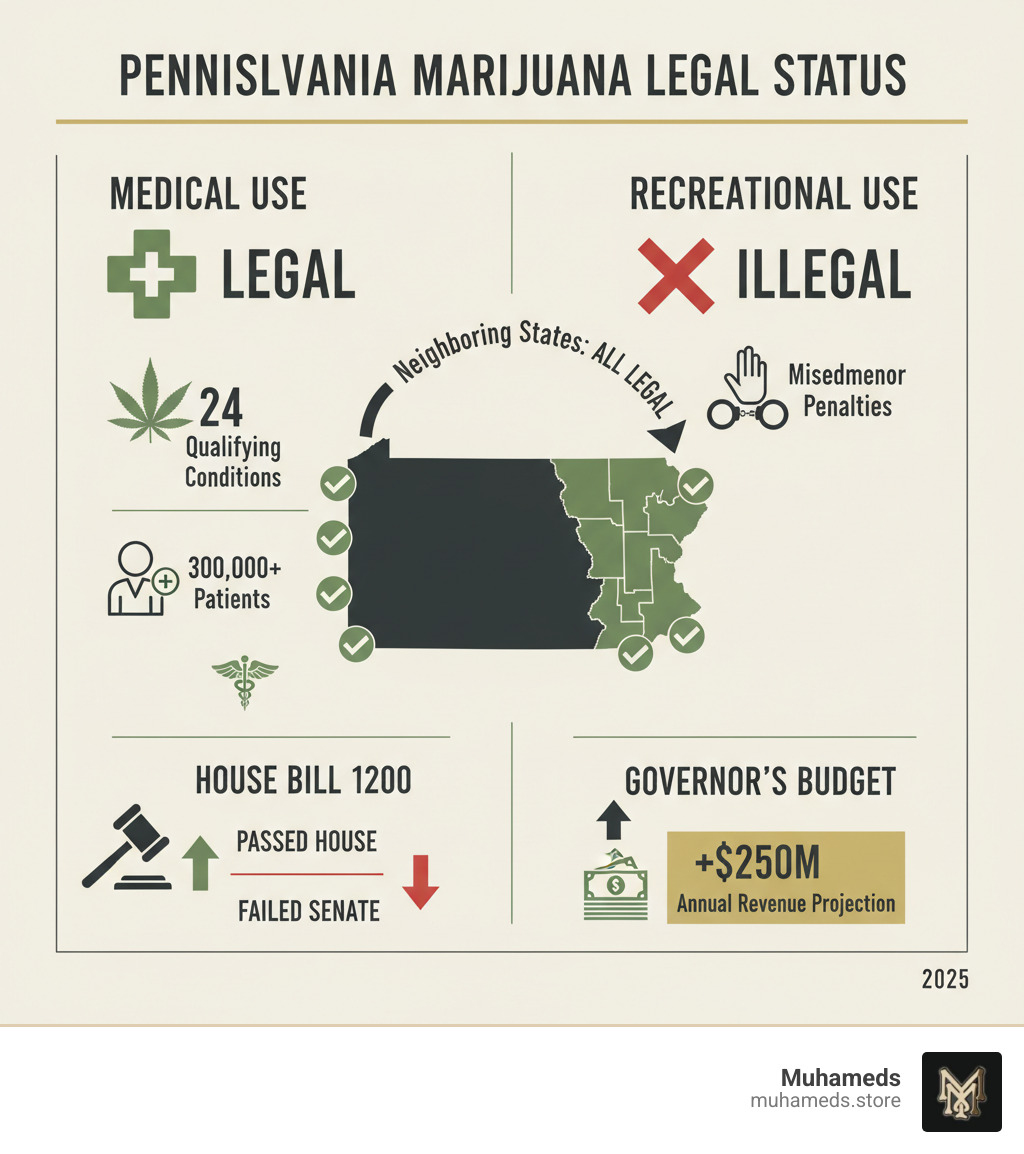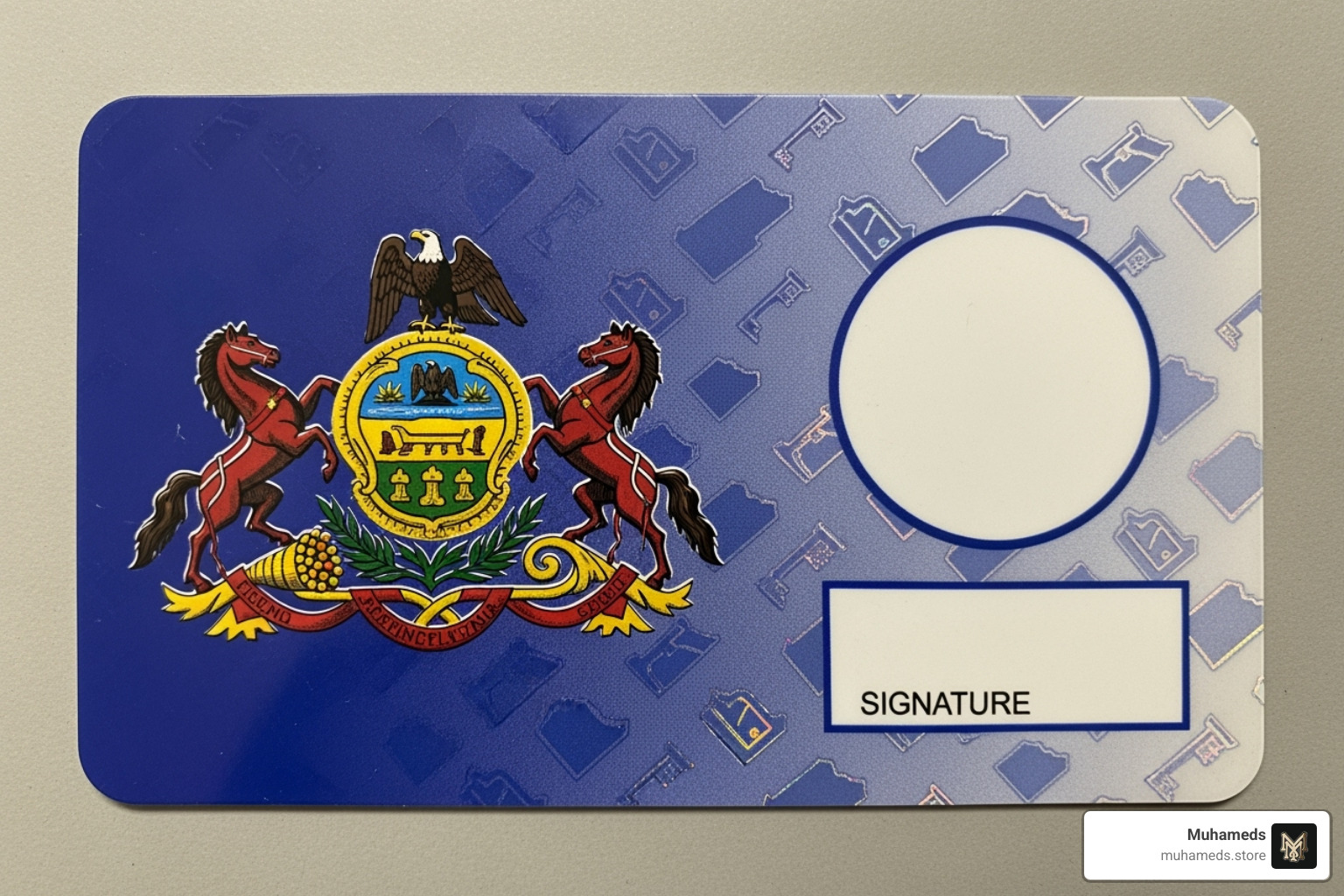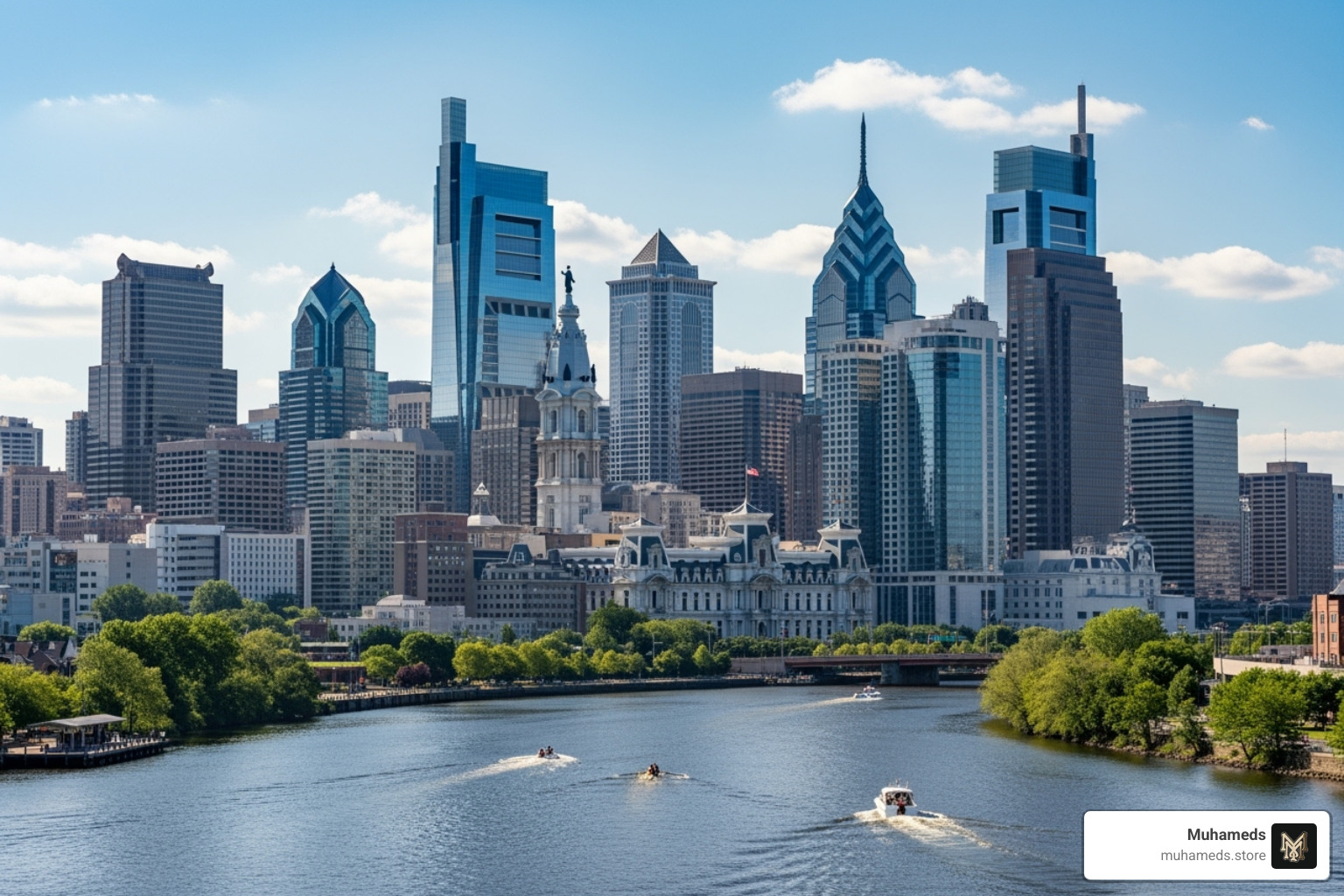Pennsylvania’s Cannabis Conundrum: Decoding the State’s Marijuana Legality

Understanding Pennsylvania’s Complex Cannabis Laws
Is marijuana legal in pa? The answer depends on the type of use. Here’s what you need to know:
Quick Answer:
- Medical Marijuana: ✅ Legal since 2016 for patients with qualifying conditions
- Recreational Marijuana: ❌ Illegal – possession remains a misdemeanor with potential fines and jail time
- Legislative Status: Bills to legalize adult-use cannabis have passed the House but face Senate opposition
Pennsylvania is in a unique position. While medical cannabis has been legal since 2016, recreational use is illegal, making it one of only 19 states where adults can be jailed for simple possession. In 2023 alone, over 11,000 people were arrested for cannabis possession. Meanwhile, most neighboring states have legalized adult-use cannabis, creating a competitive disadvantage as Pennsylvanians cross state lines for legal products.
The legislative landscape is shifting. In May 2025, the House passed a bill to legalize adult-use marijuana via state-run stores, but the Senate tabled it six days later. However, Governor Josh Shapiro’s budget proposals and alternative Senate bills show the conversation around is marijuana legal in pa is far from over.
I’m Mark Satoshi, a cannabis regulation expert. This guide breaks down everything you need to know about Pennsylvania’s current laws, penalties, and the ongoing push for legalization.
The Current Legal Landscape: Is Marijuana Legal in PA?
When people ask “is marijuana legal in pa?” the answer depends on the use. Pennsylvania has two parallel systems: one where medical patients legally access cannabis, and another where recreational users face criminal penalties for the same substance. Let’s break down what’s legal and what isn’t.
Recreational Use: Still a Misdemeanor
Recreational marijuana is illegal in Pennsylvania. Possession without a medical card is a criminal offense. In 2023, law enforcement made over 11,000 arrests for cannabis possession, as Pennsylvania remains one of just 19 states where simple possession can lead to jail time.
The penalties depend on the amount. Possession of under 30 grams (or 8 grams of hashish) is an ungraded misdemeanor. A first offense can result in up to a $500 fine and 30 days in jail.
Possession of over 30 grams is more serious, with potential fines up to $5,000 and up to a year in jail for a first offense. Subsequent offenses carry penalties as high as $25,000 and three years of incarceration.
A conviction also has long-term consequences, including disqualification from federal student aid, housing eviction, and employment difficulties. Even a minor possession charge can affect your life for years.
Pennsylvania’s Thriving Medical Marijuana Program
On the brighter side, medical marijuana has been completely legal in Pennsylvania since 2016. Governor Tom Wolf signed Act 16 (the Medical Marijuana Act) on April 17, 2016, making PA the 24th state with a medical program.
The first legal sales occurred on February 15, 2018, and the program has grown significantly. In 2024, over 300,000 residents were approved for anxiety disorders alone, just one of the 24 qualifying serious medical conditions.
The Pennsylvania Department of Health oversees the program, balancing patient access with safety. You can find comprehensive information on qualifying and applying through the official state guidelines for patients.
The program continues to evolve, with regulations updated in March 2023. These ongoing adjustments show the state’s commitment to improving access and safety for patients.
At Muha Meds, we understand the need for trusted, high-quality products for serious medical conditions. The medical program has provided relief for hundreds of thousands of Pennsylvanians, and that’s something worth celebrating as we work toward broader legalization.
So, is marijuana legal in pa? Yes, for qualified medical patients. No, for recreational use. It’s a divided landscape that may not last much longer.
The Push for Adult-Use Legalization: A State Divided
While medical cannabis is established, the journey to legalize adult-use cannabis in Pennsylvania has been a winding road of legislative efforts and political divides. The question of is marijuana legal in pa for recreational use is a key policy debate.
Governor Josh Shapiro is a vocal champion of legalization, including it in his FY 2025–2026 budget proposals. His vision is to legalize adult-use cannabis by July 1, 2025, with sales starting January 1, 2026. The industry could generate $250 million annually and $1.3 billion over five years. This revenue could fund schools and infrastructure, while a regulated market would replace unregulated products with lab-tested alternatives.
Public support is strong, with a 2022 poll showing that 66% of registered voters in Pennsylvania support legalizing recreational cannabis. Yet, the legislative path is difficult. Pennsylvania is at a competitive disadvantage as neighboring states like New York, New Jersey, and Ohio have already legalized.
The Rise and Fall of House Bill 1200
In May 2025, House Bill 1200 (HB 1200) offered a promising path to legalization. On May 7, 2025, the House passed the bill, which proposed a state-run store model overseen by the Pennsylvania Liquor Control Board (PLCB). This model aimed to control the market and keep tax revenue in-state, with a proposed 12% tax on cannabis products plus the existing 6% sales tax.
However, on May 13, 2025, the Senate Law and Justice Committee voted 7-3 to table the bill, effectively killing it. The failure of House Bill 1200 highlighted deep philosophical divides.
Committee Chair Dan Laughlin called the state-store model “DOA” in the Senate. Objections centered on the PLCB model being outdated and the exclusion of private businesses from the retail market. Other concerns included the bill being rushed through the House and the constitutionality of state employees selling a federally illegal substance.
Alternative Paths Forward: Private Models and Budget Proposals
Despite HB 1200’s failure, the momentum for legalization has evolved. The conversation has shifted toward bipartisan Senate proposals that could bridge the divide.
Senators Laughlin and Street are working on a bill for a private retail model regulated by a new Cannabis Control Board. This approach addresses the concerns that sank HB 1200. Meanwhile, Governor Shapiro’s budget proposals continue to push the conversation forward, including $10 million for restorative justice initiatives and a $25 million fund to support small and diverse businesses.
The economic argument for legalization is strong. Pennsylvania loses significant revenue to its neighbors, as reports suggest up to 60% of customers at border-state cannabis retailers are from PA. That’s money that could be funding Pennsylvania schools, roads, and jobs.
At Muha Meds, we know quality cannabis improves lives. A regulated market would create thousands of jobs, generate hundreds of millions in annual tax revenue, and ensure product safety. The question isn’t if Pennsylvania will legalize, but when and how.
Penalties and Local Policies: Navigating a Patchwork of Laws
While the debate over “is marijuana legal in pa” for recreational use continues, understanding the current penalties and the confusing reality of local decriminalization is critical. Your legal fate can depend on which city you are in.
State-Level Penalties for Possession
Under Pennsylvania state law, recreational marijuana is illegal, and the penalties are serious, affecting your career and housing for years.
- Possession of under 30 grams (or 8 grams of hashish) is an ungraded misdemeanor. A first offense carries a $500 fine and up to 30 days in jail.
- Possession over 30 grams is also an ungraded misdemeanor, with a potential $5,000 fine and up to one year in jail for a first offense. Subsequent offenses can lead to a $25,000 fine and three years in prison.
- Drug paraphernalia charges are also common. Items like pipes or rolling papers can lead to a separate charge with a maximum $2,500 fine and one year of incarceration.
The real damage often comes from “collateral consequences,” such as losing eligibility for federally subsidized student aid, employment difficulties, and housing eviction.
City-Specific Decriminalization Efforts
Fortunately, some Pennsylvania cities have passed local ordinances to decriminalize small amounts of cannabis, treating possession as a civil, not criminal, offense.
Philadelphia and Pittsburgh led the way, decriminalizing possession of up to 30 grams of cannabis with a $25 civil fine. Harrisburg, York, Erie, Allentown, Bethlehem, Lancaster, and Carlisle have similar policies with fines from $25 to $100. Delaware County has a $50 fine for up to 30 grams, and Doylestown has ended criminal penalties for small amounts.
State College has a $250 fine for possession, but there’s a catch: Penn State University Police often charge under state law, not the local ordinance, meaning you could still face misdemeanor charges.
The problem with this patchwork system is that state law still applies everywhere. Police have discretion to file state charges instead of using local ordinances. This creates an inconsistent system where outcomes vary by location and officer. At Muha Meds, we believe this confusion shows the need for state-level reform. Until then, know both state and local laws, and remember that decriminalization is not a guarantee against criminal charges.
Pennsylvania vs. Its Neighbors: An Island of Prohibition
Pennsylvania stands out on the US cannabis legalization map. While the state debates if is marijuana legal in pa for recreational use, most of its neighbors have already legalized it, making Pennsylvania an island of prohibition. The consequences are economic and significant.
Pennsylvania residents can easily drive to New York, New Jersey, Delaware, Maryland, or Ohio to buy legal recreational cannabis. Reports show up to 60% of customers at border-state retailers are from PA. This means neighboring states collect tax revenue that could be funding programs in Pennsylvania.
Let’s take a closer look at how Pennsylvania compares to its neighbors:
| State | Medical Marijuana Legal? | Recreational Marijuana Legal? |
|---|---|---|
| Pennsylvania | ✅ Yes | ❌ No |
| New York | ✅ Yes | ✅ Yes |
| New Jersey | ✅ Yes | ✅ Yes |
| Delaware | ✅ Yes | ✅ Yes |
| Maryland | ✅ Yes | ✅ Yes |
| Ohio | ✅ Yes | ✅ Yes |
| West Virginia | ✅ Yes | ❌ No |
Five of six bordering states have legalized adult-use cannabis. Only West Virginia shares PA’s restrictive stance. This means Pennsylvania is losing revenue and job opportunities while its residents risk criminal penalties for a substance that is legal just miles away.
The competitive disadvantage is real. Governor Shapiro’s projection of $250 million in annual revenue is based on the success of neighboring states. At Muha Meds, we believe access to quality, lab-tested cannabis shouldn’t require crossing state lines. The regional context makes the question of is marijuana legal in pa for recreational use more urgent.
Frequently Asked Questions about Marijuana in PA
Given the complex and evolving nature of cannabis laws in Pennsylvania, it’s natural to have questions. We’ve compiled some of the most common inquiries to help clarify the situation.
Can I use a medical marijuana card from another state in Pennsylvania?
No. Pennsylvania’s Medical Marijuana Program does not have reciprocity with other states. A medical card from another state is not valid for purchasing or possessing medical cannabis in Pennsylvania. Likewise, a Pennsylvania card is generally not recognized in other states. If you move to Pennsylvania, you must register with the state’s program to legally access medical cannabis.
Is it legal to grow my own marijuana in PA?
No. Home cultivation of marijuana is currently illegal in Pennsylvania for all residents, including registered medical marijuana patients. While many states allow home cultivation for patients, Pennsylvania law is strict. All cannabis must be purchased from a state-licensed dispensary.
What happens if I’m caught with marijuana in a decriminalized city like Philadelphia?
In a decriminalized city like Philadelphia, being caught with a small amount of marijuana (up to 30 grams) typically results in a civil fine, such as $25, rather than a criminal arrest.
However, local ordinances don’t override state law. Police officers retain the discretion to charge you with a misdemeanor under state law. Factors like the amount, your behavior, and the specific police department involved can influence the outcome. For example, university police often enforce state law over local ordinances. Decriminalization offers some relief but doesn’t guarantee you won’t face a misdemeanor charge. This inconsistency highlights the need for a clear, statewide answer to the question: “is marijuana legal in pa?”
Conclusion: The Future of Cannabis in Pennsylvania
So, is marijuana legal in pa? For medical use by qualifying patients, yes. Pennsylvania has a robust program serving residents since 2016. For recreational use, the answer is no, and possession carries serious consequences.
However, change is coming. Pennsylvania is at a crossroads, with outdated prohibition laws conflicting with the reality of legalization in neighboring states. Legislative debates point to economic opportunities, including $250 million in annual tax revenue and job creation. With 66% of registered voters supporting legalization, there is a clear mandate for change.
The failure of House Bill 1200 in May 2025 was a setback, but the conversation has shifted from “if” to “when.” Governor Josh Shapiro continues to push for legalization, and bipartisan Senate efforts are seeking a compromise.
The current patchwork of state prohibition and local decriminalization is confusing and inequitable. Residents face different penalties depending on their location, and the state loses tax revenue to its neighbors. This approach is economically unsound.
At Muha Meds, we’re watching these developments closely. We believe in a future of safe, regulated, and equitable access for all, whether for medical relief or responsible adult use. We are committed to keeping you informed and advocating for sensible policies.
If you’re navigating Pennsylvania’s medical program, we’re here to help. Our goal is to deliver premium products to your door and help you stop overpaying for the medications you need.
Learn more about our prescription policies to see how we’re making access easier for Pennsylvania residents.
The future of cannabis in Pennsylvania is bright. Until full legalization happens, stay informed, stay safe, and know that we’re here to support you.







